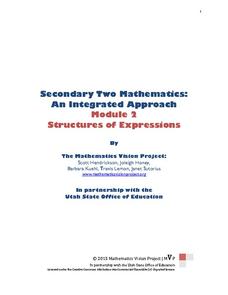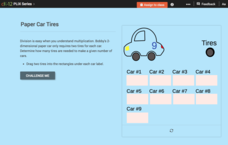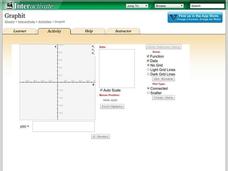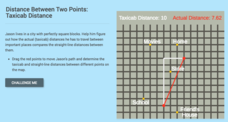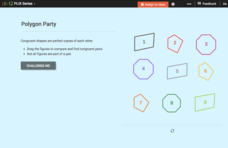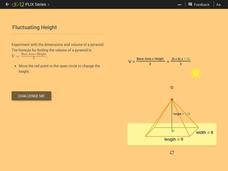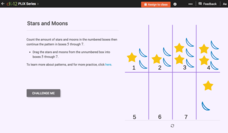Curated OER
InterMaths
Pupils can practice their French reading and writing skills while also practicing their math skills. They ask for help with math homework and check out other helpful sites.
Curated OER
Handling Data: measure of Average
Fifth graders analyze data from a simple table. In this graphing lesson, 5th graders compare distributions. Students recognize that the mean helps them find the formula. Students answer questions on the mean, median, and range.
Curated OER
Using Negative Numbers
Sixth graders practice using negative numbers by completing number equations. In this math problem solving lesson, 6th graders discuss the different ways negative numbers can be used in a math problem and practice completing...
Curated OER
Dositey.com Multiplication Problems #1
Emergent mathematicians solve single-digit multiplication word problems on this worksheet. Simple, but colorful graphics help keep youngsters' attention as they work. Keep this worksheet in your curriculum collection to use as an...
Mathematics Vision Project
Structures of Expressions
This comprehensive unit investigates transformations of quadratics, having learners follow "Optima" through the development and growth of her quilting business. Deftly weaving the story into the mathematical mechanics, the unit gives...
Mathematics Vision Project
Module 1: Functions and Their Inverses
Undo a function to create a new one. The inverse of a function does just that. An inquiry-based lesson examines the result of reversing the variables of a function, beginning with linear patterns and advancing to quadratic and...
Georgetown University
Cup-Activity: Writing Equations From Data
Determine how cup stacking relates to linear equations. Pupils stack cups and record the heights. Using the data collected, learners develop a linear equation that models the height. The scholars then interpret the slope and the...
World Wildlife Fund
Arctic Shapes
In a two-part worksheet, young geometers examine 3-D shapes and describe their attributes in a table. They will be able to draw the shape and name the number of vertices, faces, and edges. In the second part, individuals explore...
CK-12 Foundation
Sums of Integers with Different Signs: Board Game
Five questions challenge scholars to show what they know about integers. Using an interactive board game, learners move pieces to discover where a player landed, then answer problems involving both positive and negative integers.
CK-12 Foundation
Single Variable Division Equations: Paper Car Tires
Don't tire of solving equations, mix up your lesson! A virtual interactive has users drag paper tires to toy cars. Solving a one-step equation lets them find how many cars can be made from a given number of tires.
Shodor Education Foundation
Graphit
No graphing calculator? No worries, there's an app for that! Young mathematicians use an app to graph functions. In addition, they can also plot data points.
CK-12 Foundation
Estimation of Whole Number Multiplication and Division: Lettuce Garden
Estimating whole number multiplication and division is the focus of an interactive that uses a garden plot with moveable points to answer six questions.
CK-12 Foundation
Multiplication of Rational Expressions
There's nothing irrational about this lesson. Explore the process of multiplying rational expressions through discovery. A well-designed lesson has learners factor and multiply rational expressions by dragging factors to the correct...
CK-12 Foundation
Sum and Difference of Cubes: Stacking Blocks
Investigate polynomial factoring patterns by finding a connection to volume. As learners build a three-dimensional solid from smaller solids, they convert the visual model to a mathematical expression. Their models represent the sum of...
CK-12 Foundation
Intercepts and the Cover-Up Method: The Hidden Zeros
There's no need to cover up this resource — it's good one! Pupils use a slider interactive that covers up parts of the standard form of a linear equation and simultaneously reveals one of the intercepts of the graph. This lets them see...
CK-12 Foundation
Definition of Probability: It's in the Bag!
It's not in the bag. An interactive provides the probability of picking a certain color marble from a bag after several marbles have been removed. Young mathematicians learn about dependent events from this resource.
CK-12 Foundation
Equations of Parallel Lines: Exploring Equations
Same slope, different point — what's the same and what's different about an equation? Young mathematicians use an interactive to position a line parallel to a given line and through a given point. They observe that the equation will have...
CK-12 Foundation
Distance Between Two Points: Taxicab Distance
Apply geometry to find the distance as the crow flies. An engaging lesson compares the distance a car must drive to the straight line distance between two locations. Scholars must manipulate a simulation, note the change in distances,...
CK-12 Foundation
Ordered Pairs in Four Quadrants
One quadrant just isn't enough. Pupils learn to plot points in the four quadrants of a coordinate plane using an interactive. A set of challenge questions tests their understanding of the skill.
CK-12 Foundation
Complementary Angles: Corner Kick
Soccer is all about angles. Young mathematicians use an interactive to correctly position the path of a soccer ball so that it reaches the goal. They consider complementary angles when answering a set of challenge questions.
CK-12 Foundation
Properties of Congruence: Polygon Party
Don't let congruent figures drag you down. Young mathematicians use an interactive to drag figures onto one another to determine if the figures are congruent.
CK-12 Foundation
Volume of Pyramids: Fluctuating Height
The height of a pyramid may change, but the usefulness of the interactive will not. Learners drag the apex of a pyramid to change its height. They then answer a set of challenge questions designed to investigate how changing the...
CK-12 Foundation
Writing Basic Equations: Stars and Moons
You'll be over the moon about finding a useful resource for describing patterns. Aspiring mathematicians drag moon and star shapes to complete a shape pattern. Additionally, they must write an algebraic equation to describe the pattern.
CK-12 Foundation
Sums and Differences of Single Variable Expressions: Algebraic Soup
Alphabet soup just got an upgrade. Pupils drag expressions from algebraic soup to indicate whether it is a like term to x or to y. Some challenge questions require combining the like terms to simplify expressions.






